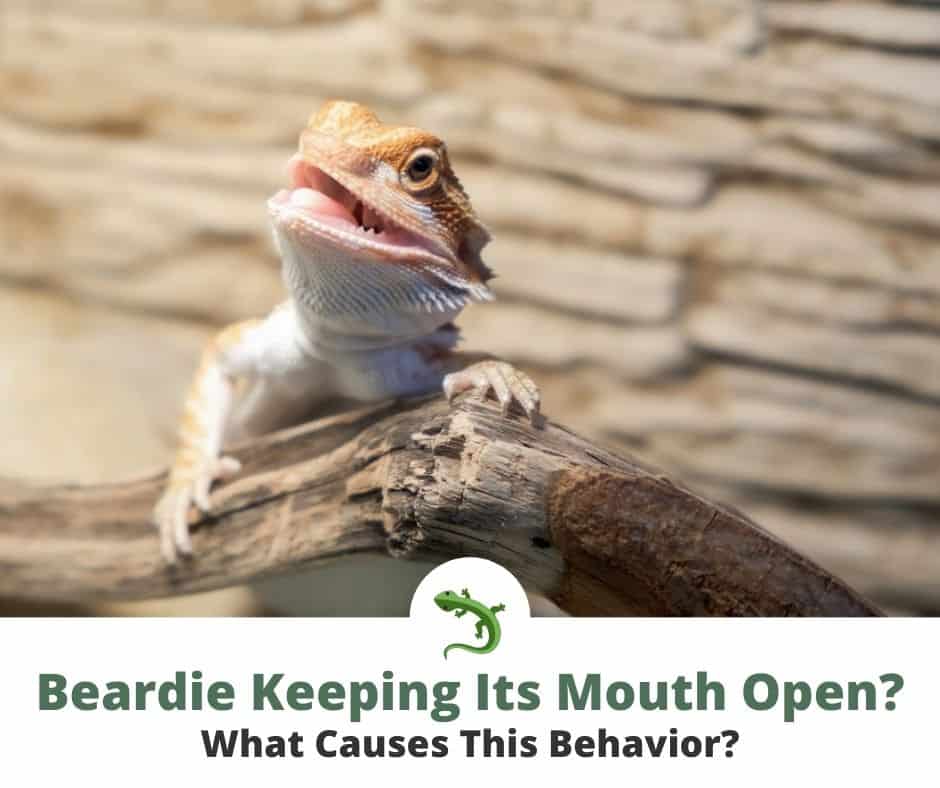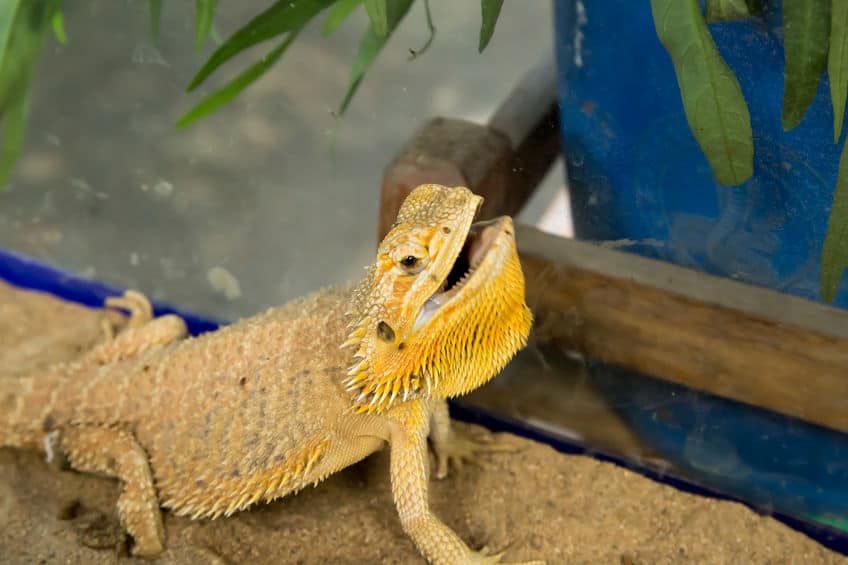Is your bearded dragon keeping its mouth open more than usual?
In this guide, you’ll learn:
- What causes open-mouth behavior in bearded dragons?
- Does it signify a serious condition?
- When should you see a vet?

Bearded dragons are curious and fascinating animals, and if you have one around, you have probably witnessed them spend long periods of time with their mouth open.
Although most of the time this behavior it’s not a cause for concern, keeping their mouth open can also be a sign that their health is at risk or that they are experiencing a stressful situation.
Caution
If your bearded dragon is exhibiting any signs of difficulty breathing or a sudden change in appetite, you should consult a Veterinarian as soon as possible.
5 Reasons Your Bearded Dragon Keeps Its Mouth Open
1. Temperature
Heat is crucial to bearded dragons. They need it to digest and maintain their immune systems. Since lizards are cold-blooded animals, they need to obtain heat from outside sources through basking. Lizards don’t sweat, so they keep their mouth open to lower their body temperature. Bearded dragons hold a temperature between 94 and 97.3 degrees and to prevent overheating they open their mouth to expel the excess heat. This behavior is called gasping and it’s very common among bearded dragons.
2. Stretching and shedding
Like many other animals, bearded dragons need to stretch. When beardies stretch their jaw muscles, you may notice they move their mouth in shorter intervals than when gaping. Bearded dragons exercise their mouth muscles particularly often when they are about to start shredding. Opening and closing their mouth helps them to loosen the skin which they will later shed.
During their shedding process, it is common that the activity level of your pet might also drop for a few days.
3. Aggression
Bearded dragons can also keep their mouth open when they feel threatened. If a bearded dragon finds itself in a stressful situation, it might hiss and puff its beard while opening its mouth. Bearded dragons are in general calmed and friendly animals, but stress situations and feeling exposed can trigger their aggressive side.

When a beardie is feeling in danger you might notice they also bloat their chest in order to appear larger and more threatening. They can also turn their beard black if they feel under pressure. When your bearded dragon is opening its mouth and hissing or showing other symptoms of stress, it might need some time alone.
Long-term stress can have severe effects on the health of bearded dragons. Providing hiding and protected places for your beardie will reduce potential stressful situations.
📚 Read More >> Bearded Dragon Stress
4. Respiratory Infection
If you notice your beardie opening their mouth for longer times and making a light clicking sound while breathing, your reptile might be suffering from a respiratory infection.
Bearded dragons can’t cough, so they maintain their mouth open to breathe when their respiratory tracts are blocked. You might also hear them making a high-pitched sound, similar to a sneeze when they are trying to clear the mucus from their lungs.
Respiratory tract infections in bearded dragons are usually accompanied by other symptoms, such as lack of appetite or energy, discharges or bubbles from their eyes or nose, and unnaturally rapid breathing.
Respiratory infections can be viral, bacterial, parasitic, or fungal, but they are most frequently bacterial. Exposing your beardie to high humidity can trigger bacterial infections in their lungs. In order to prevent these, keep the humidity of the tank under 40 %. Having a hygrometer will help you monitor the levels of humidity of the tank to prevent your lizard from becoming ill.
📚 Read More >> Best Thermometers For Bearded Dragons
If you suspect your bearded dragon might have a respiratory problem, you should take your lizard to the veterinarian to assess the gravity of the infection and give it appropriate treatment.
5. Mating season
You might notice that your reptile becomes particularly aggressive and agitated during certain times of the year. Normally around summer bearded dragons experience mating periods, showing more territorial and hostile behaviors than usual. During these weeks bearded dragons also open and close their mouths in order to impress and scare potential intruders.
There is not much you can do to prevent the aggressiveness that characterizes beardies during this season, but you can make sure that your lizard is not exposed additional to stress triggers, like other pets or people during this time.
Place the tank in a quiet space and give your reptile some time to become peaceful and friendly again.
When Should You See A Vet?
Although keeping their mouth open is normally not a cause for worry in a bearded dragon, if you notice anomalous patterns in your lizard’s behavior, you should consider visiting a veterinarian. Besides showing difficulties breathing, a particularly passive mood or lack of appetite can also be signs of a respiratory infection that can threaten the health of your reptile.
Affected lizards may also present other symptoms, such as discharge from their eyes or nose and unnaturally rapid breathing.
There are many causes of respiratory tract infections. They can be bacterial, fungal, parasitic, or viral. Consulting with an expert is the best way to ensure the appropriate treatment for your pet and prevent possible complications.
FAQs
Do Bearded Dragons open their mouth when happy?
If your bearded dragon is calm and happy, it will have an active life. This of course includes basking, so when you see your reptile in a friendly attitude while keeping its mouth open there is nothing you should worry about, it might just be a bit too warm for him.
However, having their mouth open while hissing or acting nervously, might be a sign that your bearded dragon is experiencing stress.
How do you know if your bearded dragon is happy?
Bearded dragons have many ways of showing that they are in good health and happy with you, but as they have an independent and quiet nature, it might not be as obvious as with other animals.
Having an active life and showing no signs of hostility towards you is the main parameter to assess the happiness of your reptile.
In order to ensure its good health, make sure the living conditions of your beardie are optimal, keeping the tank temperature between 75-85°F during daytime – 70-75°F at night- and keeping the humidity levels under 40 %.
Making sure that your bearded dragon lives in a quiet and protected space, with places to hide and not be seen will help your pet to have a happy and healthy life.
How do bearded dragons show affection?
Although they are quite independent, beardies are known for being the most sociable of reptiles. If your beardie is comfortable with you, it will love to spend time perched on your shoulder or hand, or just spending time near you.
If your bearded dragon is happy, it will also try to catch your attention by standing on its legs and even scratching the glass of the tank to spend time together with you.
Sharing time together outside their cage can become a routine and it is definitely a sign of good physical and mental health for your pet.
What does it mean when your bearded dragon licks you?
Bearded dragons lick in order to explore and familiarize themselves with their surroundings. This of course includes you, so do not worry if your reptile licks your hand, they are just getting to know you. Their tongue allows them to gather information about the world that surrounds them, thanks to Jacobson’s organ. Jacobson’s organ analyzes the particles reptiles gather with the tongue, allowing them to complete the information they get through their eyes and ears. You might notice that your bearded dragon will lick not only you but also everything else in reach, even the air in order to gain better knowledge of their environment.


